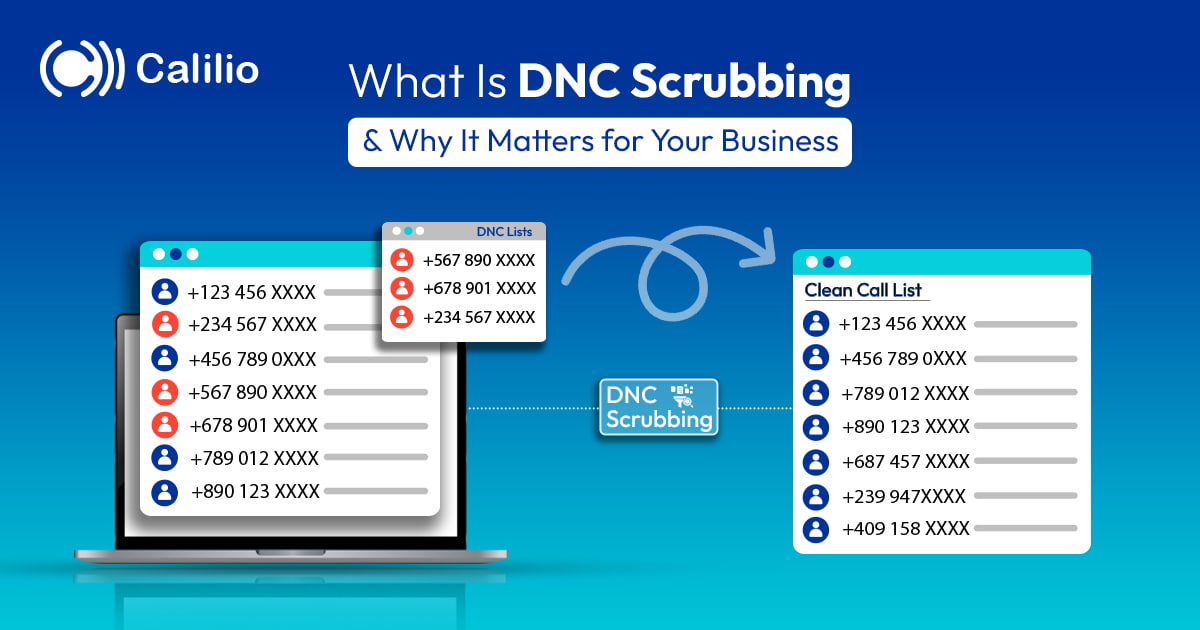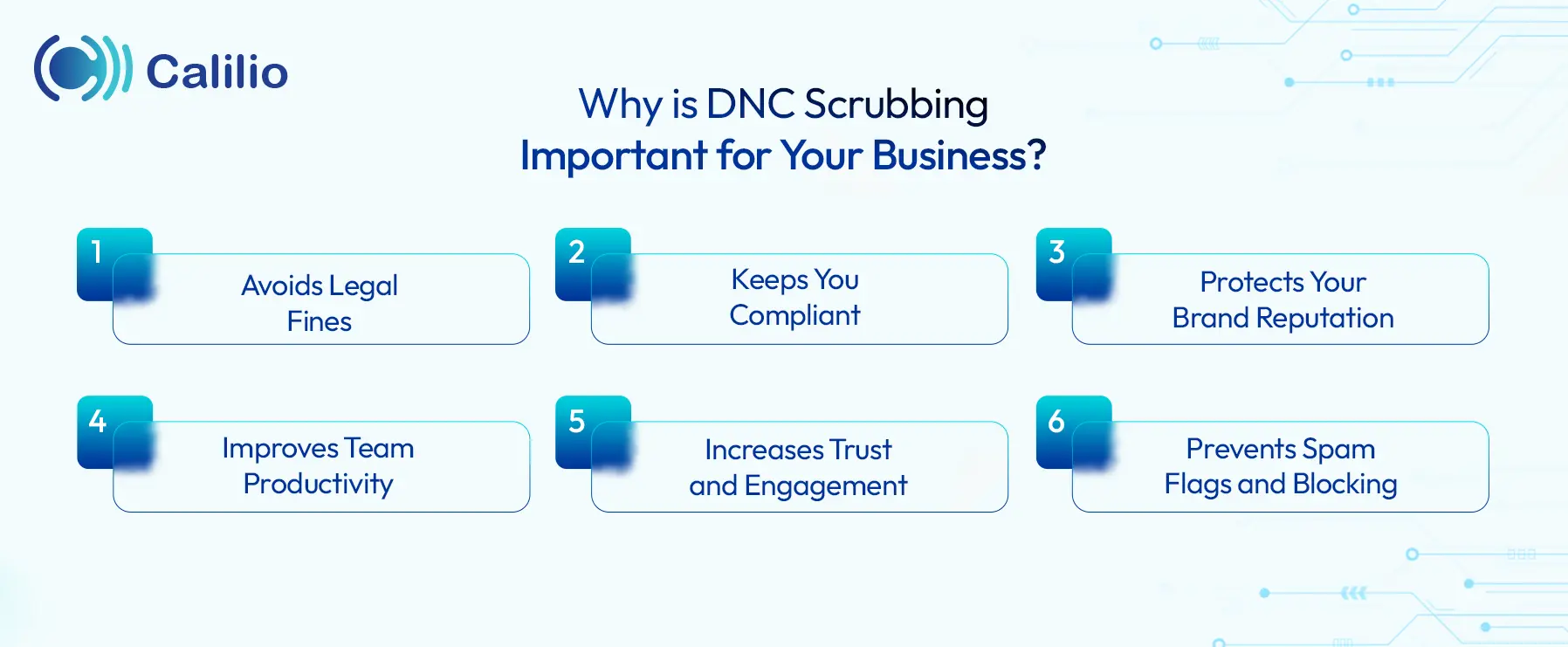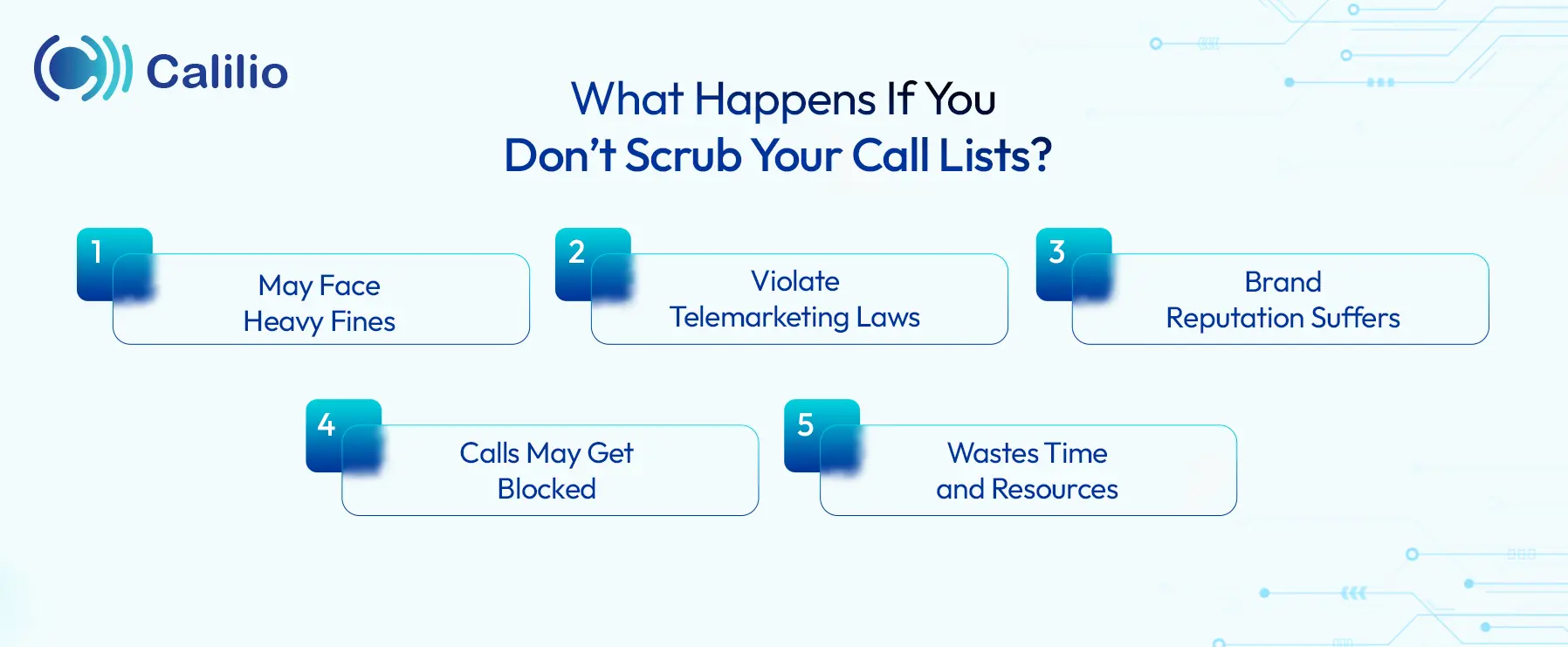What is DNC Scrubbing and Why is It Important?

Many businesses run outbound calling campaigns to reach new customers or follow up with leads. But it’s important to remember—you can’t call every number. For instance, contacting numbers listed on the Do Not Call (DNC) registry can lead to legal fines, spam reports, and customer complaints. Even a single mistake can damage a brand’s reputation and affect campaign performance.
DNC scrubbing filters out numbers you’re not allowed to contact. It ensures your call lists stay compliant, improves campaign efficiency, and protects your business from unnecessary risk.
In this blog, we’ll explain what DNC scrubbing is, how it works, and why every business that makes outbound calls should use it.
Key Highlights:
DNC scrubbing removes phone numbers listed on national, state, or internal Do Not Call registries to help businesses stay legally compliant.
You can scrub numbers by uploading your contact list to a DNC scrubbing tool, removing restricted entries, and updating your call database.
Scrubbing your list protects your business from legal fines, improves call efficiency, and helps maintain a trusted brand reputation.
Contacting the numbers that are not allowed for calling can lead to fines, blocked calls, customer complaints, and wasted resources.
To stay compliant, scrub your list regularly, use accurate tools, document each scrub, and train your team to manage opt-outs.
What is DNC Scrubbing?
DNC scrubbing is the process of identifying and removing the phone numbers from your call list that are registered on the federal Do Not Call (DNC) registries. These registries include national, state-level, and internal company ‘Do Not Call’ lists where people ask not to receive marketing or sales calls.
When you perform DNC scrubbing, your list is cross-checked against these registries to filter out restricted numbers. It ensures that your outbound calls remain compliant with telemarketing laws and helps prevent potential legal issues.
How to Scrub Numbers Against DNC List?
To scrub numbers against the DNC list, access the official Do Not Call registries and use a scrubbing tool to compare your contact list. The tool will remove or flag restricted numbers, helping you update your database.
Step 1: Access the DNC Registry
- Step 2: Upload Your Contact List
Upload your outbound call list into a DNC scrubbing tool or software. This tool compares your list against the DNC registry. - Step 3: Remove or Flag Restricted Numbers
The software identifies numbers registered under DNC and either removes them or flags them as "Do Not Call." - Step 4: Update Your Calling Database
Revise your calling list based on the scrubbed results. Only numbers that pass the check remain eligible for contact. - Step 5: Document the Process
Keep records of when and how you scrubbed the list. These logs serve as proof of compliance if regulators request them.
Why is DNC Scrubbing Important for Your Business?
DNC scrubbing helps your business stay compliant, avoid legal fines, and maintain trust by removing restricted numbers from your call lists. It also improves your team’s productivity by ensuring agents focus only on valid, reachable leads instead of wasting time on blocked or non-permissible contacts.

- Avoids Legal Fines: Calling a number on the Do Not Call list can lead to hefty fines, often thousands of dollars per violation, depending on the country. DNC scrubbing removes these numbers from your list, so you don’t break the rules.
- Keeps You Compliant: Telemarketing laws like the TCPA or DNCL require you to check your call lists regularly. Scrubbing helps you follow these laws and avoid complaints.
- Protects Your Brand Reputation: Unwanted calls lead to frustration and damage your image. People may block your number, leave bad reviews, or report your business. By scrubbing your list, you avoid contacting the people who are not interested in your product or service.
- Improves Team Productivity: When your team only calls allowed numbers, they save time and effort. They avoid dead ends and focus on people who are more likely to respond.
- Increases Trust and Engagement: People are more likely to listen when they feel respected. Reaching the right audience helps build trust and boost engagement.
- Prevents Spam Flags and Blocking: Phone carriers and spam filters track calling behavior. If you contact too many restricted numbers, they may block or flag your calls. DNC scrubbing helps you avoid it.
Who Should Use DNC Scrubbing?
Any business that makes frequent calls, like telemarketing, call centers, and marketing agencies, needs DNC scrubbing. Whether you’re promoting a product, offering a service, or conducting surveys, you must ensure your call list follows Do Not Call rules.
Here are the various types of businesses and teams that should always use DNC scrubbing:
- Sales Teams and Call Centers: Sales and call center teams rely heavily on outbound calls to reach prospects and clients. DNC scrubbing ensures they contact only eligible numbers.
- Marketing Agencies: Agencies running phone-based outreach campaigns must use DNC scrubbing to prevent legal issues and protect both their own and their clients’ reputations.
- Telemarketers: Telemarketing firms deal with high call volumes daily. So, DNC scrubbing ensures they only connect with consumers who have not opted out of marketing calls.
- Customer Support Teams: While customer service calls are often inbound, support teams that make follow-up or feedback calls benefit from DNC scrubbing to ensure compliance with customer communication preferences.
What Happens If You Don’t Scrub Your Call Lists?
Not scrubbing your call lists can lead to legal fines, as calling numbers on the Do Not Call registry violates telemarketing laws. It also harms your brand reputation, reduces call delivery rates, and wastes your team’s time and resources.

- May Face Heavy Fines: Calling numbers on the Do Not Call registry can lead to strict penalties. Regulators can fine your business thousands of dollars per call, even if it’s unintentional.
- Violate Telemarketing Laws: Failing to scrub your list means you ignore legal requirements. This can lead to complaints, investigations, and even lawsuits, depending on your region.
- Brand Reputation Suffers: Unwanted calls often lead to angry customers, spam reports, and public backlash. People lose trust in your brand, and once that happens, it’s hard to win it back.
- Calls May Get Blocked: Carriers and call-blocking apps can flag your number if they detect complaints or patterns of unwanted calls. This lowers your call connection rate and affects campaign performance.
- Wastes Time and Resources: Without scrubbing, your team spends time calling people who shouldn’t be contacted. This lowers productivity and increases campaign costs.
Best Practices for DNC Scrubbing
To stay compliant and efficient, always scrub your contact lists before launching any new campaign using a reliable DNC scrubbing tool. Keep your internal DNC list updated, document each scrubbing process, and train your team on compliance rules. Also, provide customers with a clear and easy opt-out option to maintain trust and transparency.
- Scrub Before Every Campaign: Always scrub your call list before starting any outbound calls.
- Use Reliable Scrubbing Software: Choose tools that check your list against the most recent DNC data. Avoid manual checking, as it can lead to errors and missed numbers.
- Keep an Updated Internal DNC List: Maintain your own list of people who asked not to be contacted. Add new entries immediately when someone opts out.
- Document Every Scrub: Save records of each scrubbing process, including the date and source. This helps if regulators request proof of compliance.
- Train Your Team: Make sure your sales or support staff know the importance of DNC scrubbing and know the process to ensure they do not dial numbers from DNC lists.
- Offer a Clear Opt-out Option: Allow people to opt out easily during or after a call. Add those numbers to your internal DNC list without delay.
Conclusion
DNC scrubbing isn’t just a legal requirement—it’s a smart business practice. By removing numbers listed on national, state, or internal Do Not Call registries, you protect your company from costly fines, reduce spam complaints, and safeguard your brand reputation.
When your team works with a clean, compliant call list, they can focus on real opportunities instead of wasted dials. Regular scrubbing, reliable tools, proper documentation, and clear opt-out options help ensure your outbound campaigns run smoothly and stay fully compliant.
Summarize this blog with:
Frequently Asked Questions
What happens if I call a number on the DNC list?
Calling a number listed on the Do Not Call (DNC) registry can result in legal penalties, including fines. People might also report your number as spam, complain about your business, or block your calls. This can hurt your reputation and make it harder to reach real customers.
What is the DNC list?
Do I need to scrub my list if I’m calling existing customers?
How often should I scrub my call list?

Still have questions?
Can’t find the answer you’re looking for? Please chat with our friendly team.
Stay in the loop
Get the latest call insights, trends, and updates delivered straight to your inbox.
By subscribing, you agree to receive updates from Calilio.
You can unsubscribe anytime.
